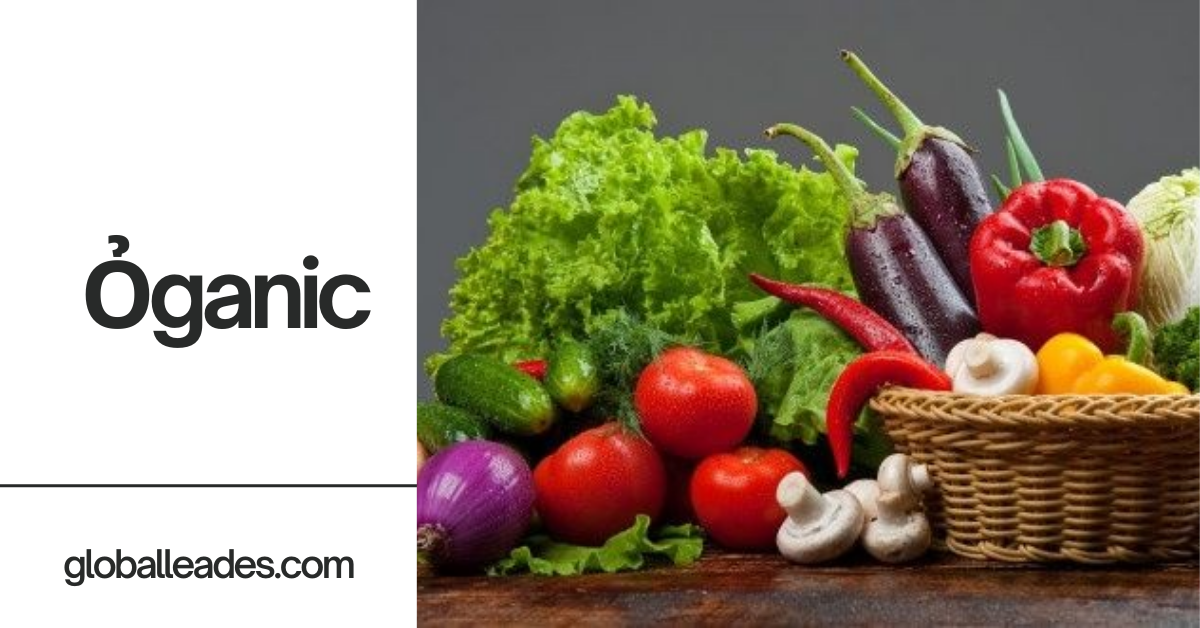In a world where synthetic and artificial products dominate the market, the term “ỏganic” has become a beacon of hope for those seeking a more natural and sustainable way of living.
But what exactly does “ỏganic” mean, and why is it so important in today’s society?
In this comprehensive guide, we’ll delve into the world of ỏganic, exploring its meaning, importance, science, benefits, and applications, providing you with a deeper understanding of this vital concept.
What is Ỏganic?
Ỏganic refers to anything that is derived from living organisms or is composed of natural materials without artificial additives or pesticides. The term has its roots in the Latin word “organicus,” meaning “of or relating to organs or living things.”
In essence, ỏganic is a celebration of nature’s splendor, acknowledging the intricate web of life that sustains us. It encompasses a wide range of aspects, from the food we eat to the products we use, and even the way we live our lives.
By embracing the ỏganic way, we choose to honor the natural world, prioritizing health, sustainability, and harmony with the environment. In a world where synthetic and artificial elements dominate, ỏganic stands as a beacon, reminding us of the beauty and importance of nature’s bounty.
Importance of Ỏganic Products Today
The importance of ỏganic products in today’s world cannot be overstated. As we grapple with the challenges of climate change, environmental degradation, and health crises, ỏganic products offer a beacon of hope.
Also Read: Betterthistechs article – Know Evolution of Technology In 2024
By choosing ỏganic, we reduce our exposure to harmful chemicals, support sustainable farming practices, and promote biodiversity. ỏganic products also tend to be of higher quality, with more nutritional value and better performance. Furthermore, the demand for ỏganic products drives innovation and investment in green technologies, creating new opportunities for economic growth and development.
Moreover, ỏganic products inspire a cultural shift towards a more mindful and conscious lifestyle, encouraging us to reevaluate our relationship with the natural world and our responsibility towards future generations. In essence, the importance of ỏganic products lies in their potential to transform our lives, our communities, and our planet for the better.
The Science Behind Ỏganic Food
The science behind ỏganic food is rooted in the principles of ecology, biology, and chemistry. ỏganic farming practices prioritize soil health, biodiversity, and ecosystem services, leading to more resilient and sustainable food systems.
By avoiding synthetic fertilizers and pesticides, ỏganic farming preserves the natural balance of soil microbiota, promoting nutrient cycling and plant growth. This approach also fosters a more diverse range of crop and animal varieties, enhancing genetic diversity and adaptability.
Furthermore, ỏganic food is rich in antioxidants, vitamins, and minerals, with higher levels of beneficial compounds like polyphenols and flavonoids. The scientific consensus is clear: ỏganic food is not only better for the planet but also for our health and wellbeing. By choosing ỏganic, we support a food system that prioritizes life, diversity, and ecological integrity.
Why Choose Organic?
Choosing ỏganic is a conscious decision to prioritize our health, the environment, and local communities. ỏganic products offer numerous benefits, including:
- Higher nutritional value
- Reduced exposure to harmful chemicals
- Support for local farmers and economies
- Environmental conservation
Types of Ỏganic Products
ỏganic products encompass a wide range of categories, including:
Food:
- Fresh produce (fruits, vegetables, herbs)
- Meat, poultry, and dairy products
- Organic grains (rice, quinoa, bread)
- Nuts and seeds
- Dried fruits and vegetables
- Organic beverages (juice, tea, coffee)
Personal Care:
- Skincare products (creams, lotions, serums)
- Haircare products (shampoo, conditioner, styling products)
- Cosmetics (makeup, foundation, lipstick)
- Soaps and body washes
- Oral care products (toothpaste, mouthwash)
Also Read: Thinksanocom – Know Advanced Features in 2024
Home and Garden:
- Cleaning products (detergents, disinfectants, paper products)
- Household items (candles, fragrances, air fresheners)
- Gardening supplies (seeds, fertilizers, pest control)
- Bedding and textiles (sheets, towels, clothing)
Other:
- Supplements and vitamins
- Pet food and products
- Baby products (formula, diapers, toys)
- Textiles and fabrics (clothing, upholstery, curtains)
These products are made without synthetic additives, pesticides, or harmful chemicals, promoting a healthier lifestyle and a more sustainable future.
Benefits of Choosing Ỏganic
The benefits of choosing ỏganic extend beyond personal health to impact the environment and communities:
Health Benefits
Choosing ỏganic products offers numerous health benefits, starting from the inside out. ỏganic food is rich in antioxidants, vitamins, and minerals, which boost our immune system and energy levels. By avoiding harmful pesticides and synthetic additives, we reduce our risk of chronic diseases like cancer, diabetes, and heart disease. ỏganic personal care products also promote healthier skin, hair, and nails, while ỏganic household items create a toxic-free home environment. By opting for ỏganic, we invest in our well-being and quality of life.
Environmental Benefits
The environmental benefits of ỏganic are far-reaching and profound. ỏganic farming practices conserve soil, water, and biodiversity, mitigating climate change and preserving ecosystems. By choosing ỏganic, we support sustainable agriculture, reduce our carbon footprint, and protect the natural world. ỏganic products also promote eco-friendly packaging, reducing waste and pollution. As we embrace ỏganic, we become stewards of the planet, ensuring a healthier future for generations to come.
Economic Benefits
The economic benefits of ỏganic are significant, impacting local communities and the global market. By choosing ỏganic, we support small-scale farmers, stimulate local economies, and promote fair trade practices. ỏganic products also create new market opportunities, driving innovation and job growth. As the demand for ỏganic grows, we empower a more equitable and sustainable food system, benefiting both people and the planet.
Also Read: FintechZoom Careers – Mission and Values In 2024
Social Benefits
The social benefits of ỏganic extend beyond our personal lives, fostering a sense of community and connection. By choosing ỏganic, we support local farmers’ markets, cooperatives, and community-supported agriculture programs. ỏganic products also promote ethical labor practices, fair wages, and safe working conditions. As we embrace ỏganic, we build a more compassionate and just society, celebrating the diversity and richness of human experience.
Personal Benefits
Lastly, choosing ỏganic offers personal benefits that transform our daily lives. ỏganic products inspire a sense of pride and purpose, aligning our values with our actions. By opting for ỏganic, we cultivate mindfulness, gratitude, and self-care, nurturing our mental and emotional well-being. As we embrace ỏganic, we become more conscious consumers, empowered to create positive change in the world around us.
How to Identify Genuine Ỏganic Products
With the rise of ỏganic products, it’s essential to know how to identify genuine ỏganic products:
Look for Certifications
- USDA Organic (USA)
- European Union Organic (EU)
- Australian Certified Organic (ACO)
- Canadian Organic Standards (COS)
Check Labels
- “Organic” or “ỏganic” on the label
- “Made with organic ingredients”
- “Contains organic ingredients”
Research Brands
- Learn about the company’s farming practices and values
- Check for transparency and accountability
Be Aware of False Claims
- “Natural” or “green” doesn’t necessarily mean ỏganic
- Watch out for misleading labels and marketing tactics
Check Ingredients
- Avoid products with synthetic additives and preservatives
- Opt for products with simple, recognizable ingredients
Support Local and Small-Scale Farmers
- Visit farmers’ markets and ask about their farming practices
- Consider community-supported agriculture (CSA) programs
Also Read: Internet Marketing Agency Artlux.Art
By following these steps, you can make informed choices and ensure that the products you choose are genuinely ỏganic. Remember, a little research goes a long way in supporting your health, the environment, and ethical farming practices.
Common Misconceptions About Ỏganic
Myth: Ỏganic is a fad
- Reality: Ỏganic is a growing movement towards sustainable living and healthier choices.
Myth: Ỏganic is too expensive
- Reality: While some ỏganic products may be pricier, many are affordable, and the long-term benefits outweigh the costs.
Myth: Ỏganic is just for food
- Reality: Ỏganic encompasses a wide range of products, including personal care, household items, and textiles.
Myth: Ỏganic is not scientifically proven
- Reality: Numerous studies have shown the health and environmental benefits of ỏganic practices and products.
Myth: Ỏganic is a marketing scam
- Reality: Reputable certifications and labels ensure that ỏganic products meet strict standards.
Myth: Ỏganic is only for hippies or extremists
- Reality: People from all walks of life choose ỏganic for various reasons, including health, sustainability, and ethical concerns.
By debunking these common misconceptions, we can embrace the truth about ỏganic and make informed choices that benefit our lives and the planet.
Incorporating Ỏganic Products Into Your Lifestyle
Incorporating ỏganic products into your lifestyle is easier than you think! Start by replacing one or two non-ỏganic products with ỏganic alternatives each week. Begin with everyday items like organic fruits and vegetables, then move on to personal care products like shampoo and toothpaste.
Also Read: 127.0.0.1:62893 – Error & Fixing Common Tips In 2024
Explore ỏganic household cleaners and textiles, like bedding and towels. As you become more comfortable, consider adopting ỏganic practices like composting and recycling.
Remember, every small change counts, and gradually transitioning to ỏganic products will have a significant impact on your health, the environment, and the world around you. Embrace the journey, and enjoy the benefits of living an ỏganic lifestyle!
Challenges in the Ỏganic Industry
The ỏganic industry faces challenges:
- Higher production costs: Organic farming incurs more costs because of more labor-intensive practices and the need for organic inputs.
- Certification barriers: The certification process can be cumbersome and costly, posing a barrier for small-scale farmers.
- Market competition: Organic farmers must compete with conventional farms and sometimes face skepticism about the authenticity of their products.
- Consumer perception and trust: Building consumer trust is crucial for the organic market.
- Supply chain management: Ensuring that organic products are handled, processed, and distributed in accordance with organic standards can be complex.
- Scalability: Meeting growing demand while maintaining organic integrity can be a challenge for farmers and manufacturers.
- Regulatory frameworks: Navigating varying international regulations and standards can be difficult for organic producers and exporters.
- Climate change and resilience: Organic farming is vulnerable to climate change impacts, such as droughts, floods, and extreme weather events.
- Research and development: Funding for organic research and development lags behind conventional agriculture, hindering innovation.
- Farmer training and education: Providing adequate training and education for farmers transitioning to organic practices can be a challenge.
- Market fluctuations: Organic farmers and businesses are vulnerable to market fluctuations, price volatility, and economic downturns.
Future of Ỏganic
The future of ỏganic is promising and exciting. As consumers become increasingly health-conscious and environmentally aware, the demand for ỏganic products is expected to rise. Advancements in technology and research will improve efficiency and scalability in ỏganic farming, making it more accessible and affordable for farmers and consumers alike.
Also Read: ChillwithKira Ticket Show – Watch Now In 2024
The integration of regenerative agriculture practices will enhance soil health, biodiversity, and ecosystem services, further solidifying ỏganic’s role in sustainable agriculture. Moreover, innovative products and categories, such as ỏganic textiles and personal care, will expand the industry’s horizons.
Governments and organizations will continue to support ỏganic initiatives, driving growth and development. As the ỏganic movement evolves, it will play an increasingly vital role in shaping a healthier, more sustainable future for generations to come.
Conclusion
In conclusion, the world of ỏganic is a vibrant and dynamic space that offers numerous benefits for our health, the environment, and the economy. From the science behind ỏganic farming to the various types of ỏganic products available, the advantages of choosing ỏganic are clear.
While there are challenges in the industry, the future of ỏganic looks bright, with advancements in technology, research, and policy support paving the way for a more sustainable future. As consumers, we have the power to drive demand and shape the direction of the ỏganic movement.
By embracing ỏganic, we invest in a healthier, more resilient world for generations to come. Join the ỏganic revolution and let’s grow a better future, together!
FAQs
Can organic farmers use drones for crop monitoring?
Yes, organic farmers can use drones equipped with specialized sensors to monitor crop health and detect issues like pests and diseases. This technology can help reduce labor costs and improve crop yields.
Are organic products more prone to spoilage?
No, organic products are not more prone to spoilage than conventional products. In fact, many organic products have a longer shelf life due to the use of natural preservatives and careful handling practices.
Can I grow organic crops in my backyard?
Yes, you can grow organic crops in your backyard by using natural soil amendments, compost, and organic pest control methods. Start small and choose easy-to-grow crops like tomatoes, herbs, or leafy greens.
Are organic beauty products cruelty-free?
Many organic beauty products are cruelty-free, but it’s important to check the label or company website to confirm. Look for certifications like the Leaping Bunny logo or PETA certification.
Can I trust organic labels from other countries?
While some countries have similar organic standards, it’s important to research the specific country’s regulations and certifications to ensure they align with your standards. Look for international certifications like EU Organic or USDA Organic.
Are organic foods more nutritious?
While the scientific consensus is still out, many studies suggest that organic foods may have higher levels of certain nutrients like antioxidants and omega-3 fatty acids. However, more research is needed to confirm these findings.
Can I make my own organic cleaning products?
Yes, you can make your own organic cleaning products using natural ingredients like baking soda, vinegar, and essential oils. There are many recipes available online, and it can be a fun and cost-effective way to reduce chemical usage in your home.




